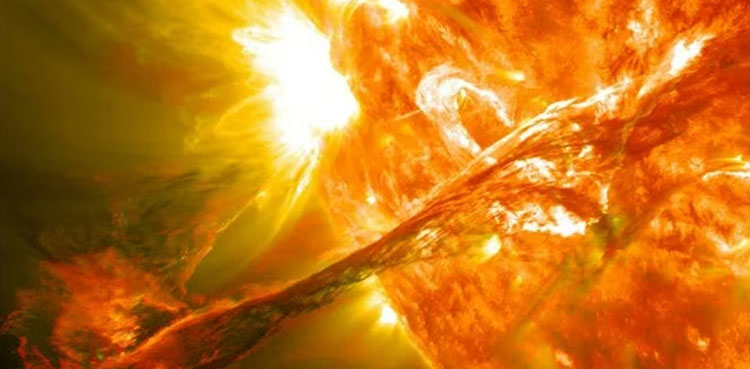
The National Oceanic and Atmospheric Administration (NOAA) has warned about a “cannibal’ coronal mass ejection” (CME) that is heading towards Earth, and could cause a strong solar storm today.
According to NOAA. an X1.6-class solar flare erupting from the Sun released two powerful CMEs On August 5. These two CME clouds have combined, with the second one overtaking the first, creating a cannibal CME.
The X1.6-class solar flare released two powerful coronal mass ejections (CMEs) on August 5 and now they have become “even more terrifying”.
The CME has been labelled “cannibalistic” which is a rarer event than a regular CME as it occurs when a fast coronal mass ejection consumes a smaller one on its way to Earth, forming a large wave of plasma.
Cannibal CMEs are increasing as the sun’s 11-year solar cycle peaks ahead of the next one which will begin in 2025.
Mass ejections are formed through a combination of multiple solar storms and an unexpected dark eruption.
Scientists have predicted that Earth can be impacted by minor geomagnetic storms which could possibly lead to outages and blackouts.
Merger of two CME clouds
The two CME clouds have merged, with the second, faster one, overtaking and cannibalising the first, said a new NOAA model adding that the merged entity has become even more powerful.
Even a glancing blow from such a cloud can spark a vicious solar storm. The latest forecast says the storm will hit the Earth later today, August 8, and can produce G3-class storms.
What Are Coronal Mass Ejections
Coronal mass ejections (CMEs) are large, fast-moving clouds of magnetised plasma and solar radiation that occasionally get flung into space alongside solar flares — powerful explosions on the sun’s surface that are triggered when horseshoe-shaped loops of plasma located near sunspots snap in half like an overstretched elastic band.
If CMEs smash into Earth, they can cause geomagnetic storms — disturbances in our planet’s magnetic field — that can trigger partial radio blackouts and produce vibrant aurora displays much farther away from Earth’s magnetic poles than normal.
from Science and Technology News - Latest science and technology news https://ift.tt/OFB4G5n
via IFTTT

